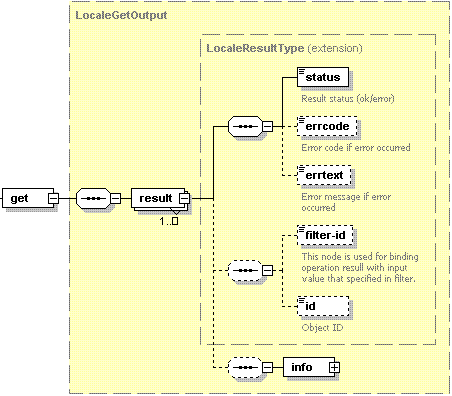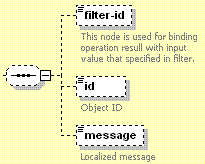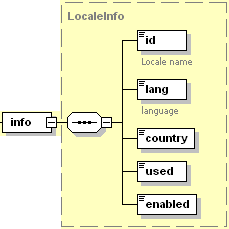Retrieving List of LP’s
Use the get operation in the following cases:
- To retrieve list of language packs installed on the server
- To retrieve detailed info on each LP
Request Packet Structure
A request XML packet retrieving info on LP’s includes the get operation node:
<packet>
<locale>
<get>
</get>
</locale>
</packet>
The get node is presented by type LocaleGetInput (locale.xsd),
and its graphical representation is as follows:

Note: The interactive schema navigator for all request packets is available here: http://plesk.github.io/api-schemas/1.6.9.1/agent_input.svg.
- The filter node is required. Specifies the filtering rule. For
more information, refer to the Available Filters
section. Data type: LocaleFilter (
locale.xsd) .
Response Packet Structure
The get node of the output XML packet is presented by type
LocaleGetOutput (locale.xsd) and structured as follows:

Note: The interactive schema navigator for all response packets is available here: http://plesk.github.io/api-schemas/1.6.9.1/agent_output.svg.
-
The result node is required. It wraps the response retrieved from the server. Data type: extension of type LocaleResultType (
locale.xsd). -
The status node is required. It specifies the execution status of the get operation. Data type: string. Allowed values: ok | error.
-
The errcode node is optional. It returns the error code if the get operation fails. Data type: unsignedInt.
-
The errtext node is optional. It returns the error message if the get operation fails. Data type: string.
-
The filter-id node is optional. It returns a filtering rule parameter if the operation fails. For more information, refer to the Available Filters section. Data type: anySimpleType.
-
The id node is optional. It holds name of the language pack matched by the filtering rule if the operation fails. Data type: string.
-
The info node is optional. It specifies LP settings. Data type: LocaleInfo (
locale.xsd). If the info node is present in the response packet, the following nodes are required:- The id node specifies the LP name. For details on language pack names, refer to the LP Names section. Data type: string.
- The lang node specifies the LP language. Data type: string.
- The country node specifies countries where this language is native. Data type: string.
- The used node specifies the number of users at all levels that use this language in their interface. Data type: integer.
- The enabled node specifies if this LP is available for users. Data type: boolean.
Remarks
In XML API 1.5.0.0, the result node also contains the message node.

- The message node is optional. It does not return any value for this operation. Data type: string.
Retrieving info on a single LP
The following request packet retrieves info on US English LP:
<packet>
<locale>
<get>
<filter>
<id>en-US</id>
</filter>
</get>
</locale>
</packet>
Response:
<packet>
<locale>
<get>
<result>
<status>ok</status>
<info>
<id>en-US</id>
<lang>ENGLISH</lang>
<country>United States</country>
<used>17</used>
<enabled>true</enabled>
</info>
</result>
</get>
</locale>
</packet>
If the LP was not found, the response from the server looks as follows:
<packet>
<locale>
<get>
<result>
<status>error</status>
<errcode>1013</errcode>
<errtext>Locale does not exist</errtext>
<filter-id>en-US</filter-id>
<id>en-US</id>
</result>
</get>
</locale>
</packet>
Retrieving info on multiple LP’s
The following request packet retrieves info on US English and Russian LP’s:
<packet>
<locale>
<get>
<filter>
<id>en-US</id>
<id>ru-RU</id>
</filter>
</get>
</locale>
</packet>
Response:
<packet>
<locale>
<get>
<result>
<status>ok</status>
<info>
<id>en-US</id>
<lang>ENGLISH</lang>
<country>United States</country>
<used>4</used>
<enabled>true</enabled>
</info>
</result>
<result>
<status>ok</status>
<info>
<id>ru-RU</id>
<lang>RUSSIAN</lang>
<country>Russian Federation</country>
<used>0</used>
<enabled>true</enabled>
</info>
</result>
</get>
</locale>
</packet>
